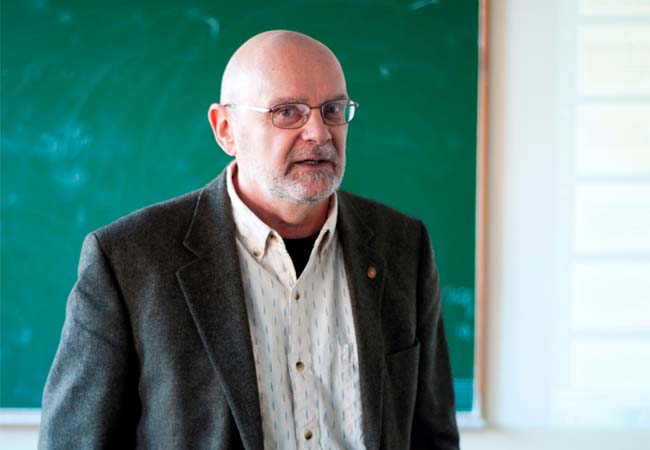
Prof. Sužiedėlis demonstrated Yale University's world map showing cases of colonial and indigenous genocide, and highlighted the more interesting cases. Congo, which is one of the rare countries in Africa with an abundance of various resources, was the place where some 2 million slaves died, mostly from work in mines. In Southeast Africa (currently Namibia), German soldiers killed 100 to 200 thousand Africans; some of those shooters became Nazi generals later on. The professor also talked of similar horrific acts in Eastern Timor, the Caribbean islands and Guatemala. The latter case involved a 1950s conflict between Spanish-born people, which were higher on the racial hierarchy at the time, and native Indians of Guatemala, which were placed at the bottom but were the majority; their revolts ended with hundreds of thousands of casualties. "This is just one example showing how the concept of genocide is semi-politicized, used to represent a certain point of view, i.e. colonial genocide", explained Prof. Sužiedėlis.
Ethiopia RPCV Saulius Suziedelis writes says the Cruel History of Genocide Still Plagues Us in 2011
Prof. Saulius Suziedelis: "Cruel History of Genocide Still Plagues Us in 2011"
Prof. Saulius Suziedelis
Kaunas, May 16, 2011 - From 23 March to 12 May, Millersville University (Pennsylvania, USA) Professor Emeritus Saulius Suziedelis held a series of public lectures at VMU on genocide and mass murder in the 20th century. His last lecture focused on genocide from the perspective of global history and politics, the concept of genocide today and in the context of Communism and Nazism.
The professor began the final lecture by reminding the definition of genocide coined by Raphael Lemkin, who claimed that it is destruction of a national pattern. Attempts to define genocide and its role in history became louder in 1995, when the greatest genocide researchers gathered at a conference in Yerevan (Armenia), commemorating the 80th anniversary since the mass murder of Armenians carried out by the Ottoman Empire. One of conference's participants, Steven Katz, opposed such a broad definition of genocide and claimed only the Holocaust can be described by that term.
Prof. Suziedelis talked about the distinctions and similarities between genocide and the Holocaust pointed out by various researchers and the discussions they sparked. For instance, some theorists said the mass murder of Jews was global, purely ideological and bureaucratically organised, as opposed to all other genocides. Broader definitions approach genocide as any repression a nation is subjected to; Lithuanian author Izidorius Ignatavičius has used the word to describe the mass murder and other oppressive acts committed to Lithuanians by the Communist and Nazi regimes.
Many other examples were remembered in the professor's lecture. David E. Stannard, Professor of American Studies at the University of Hawaii System, criticised Katz's theory by saying that the exclusion of all other cases but the Jews from the definition of genocide is akin to the denial of the Holocaust by anti-Semites, as all other genocides and massacres are trivialized in such a way.
Horrors of Genocide – All Over the World
Prof. Stannard has researched the massacres of Native Americans, in which entire tribes were wiped out and some 20 million natives died. What was controversial, according to Prof. Suziedelis, is that many of the American Indians died from diseases they caught, e.g. from the colonists' bed sheets, due to lack of immunity to fight the bacteria with antibodies. Nevertheless, it was murder on a massive scale; in 1851, the Governor of the then recently founded California signed a document that said all American Indians must be fought until they are completely extinct. In ten years that followed, more than two thirds of all Native Americans in California were murdered or died, which was typical of those times.
Later on, Prof. Suziedelis demonstrated Yale University's world map showing cases of colonial and indigenous genocide, and highlighted the more interesting cases. Congo, which is one of the rare countries in Africa with an abundance of various resources, was the place where some 2 million slaves died, mostly from work in mines. In Southeast Africa (currently Namibia), German soldiers killed 100 to 200 thousand Africans; some of those shooters became Nazi generals later on. The professor also talked of similar horrific acts in Eastern Timor, the Caribbean islands and Guatemala. The latter case involved a 1950s conflict between Spanish-born people, which were higher on the racial hierarchy at the time, and native Indians of Guatemala, which were placed at the bottom but were the majority; their revolts ended with hundreds of thousands of casualties. "This is just one example showing how the concept of genocide is semi-politicized, used to represent a certain point of view, i.e. colonial genocide", explained Prof. Sužiedėlis.
The professor then took a closer look at the Genocide Studies Program offered at Yale and the particular cases this university offers to analyse, remarking that it uses expanded definition of genocide and includes not just racial but social and political cases of mass murder as well. While the program was complimented for focusing on varied examples, such as the especially cruel social-based genocide carried out by the Khmer Rouge regime in Cambodia, Prof. Suziedelis noted the absence of the USSR in the program's syllabus.
Still No United Assessment of History
Turning to recent realities, Prof. Suziedelis spoke of the Prague Declaration on European Conscience and Communism, signed in 2008, which attracted attention to the issue of "double genocide" and sought to make the past horrors of Communism and Nazism equally recognized in Europe. The declaration caused an opposition among politicians and scientists in Israel and Western Europe, accusations were made against Ukraine, Lithuania and other countries for trivializing the significance of the Holocaust by comparing it to Communist crimes. There were plans to hold Nuremberg-like trials and sentence the leaders of the Communist regime, but they did not materialize.
"Many people in the West have a certain image of the Soviet Union in their heads because it contributed in a major way to the fight against fascism, thus somehow in their eyes the USSR is not as evil as Nazi Germany", Prof. Suziedelis said. "It is 2011 now, but this cruel history, all these genocides and –isms are still plaguing us, because, it seems, we cannot settle for a united assessment of history, which is the root of all conflicts", he concluded.
Thanking the audience for coming to his lectures, Prof. Suziedelis expressed hope that his outline of general, historical facts and background related to genocide will have provided enough understanding to more easily grasp these issues and find reliable material without getting lost in the bottomless pile of information on the Internet.
Prof. Saulius Suziedelis, born in 1945 in Gotha, Germany, spent his early years in the Brockton's Lithuanian community in Massachusetts, served in the U.S. Peace Corps in Ethiopia in 1967–1969. He acquired Ph.D. in Russian and Eastern European history at the University of Kansas in 1977. Suziedelis has worked at the U.S. Department of Justice (1982–1987), he has also published many scientific books and articles on Lithuanian history. Since 1998 he has been a member of the International Commission for the Evaluation of the Crimes of the Soviet and the Nazi Regimes in Lithuania. From 2006 to 2010 he chaired the Annual Conference on the Holocaust and Genocide at Millersville University, in which he also was a history professor.














